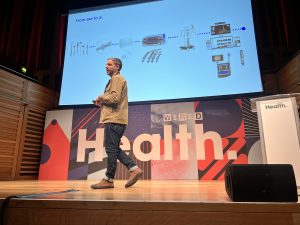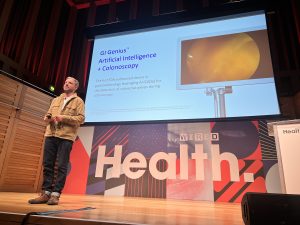WIRED Health 2025: Unwired Healthcare

The annual WIRED Health event promises to deliver the most exciting updates to the healthcare world, and this year was no exception. On the 18th of March 2025, leading experts in the field –scientists, doctors, and entrepreneurs alike– came together from across the globe to the city of London (UK) with one united goal: to spark discussions on the rapidly changing healthcare landscape.
One of WIRED Health’s key sessions came from George Murgatroyd, vice president of global medical technology giant Medtronic.
Health Technology is Stuck in the Past
Throughout the talk, George considers the transformative evolution of health tech, reflecting on the past, present, and future of medical devices.
He opens the discussion with a stark reality: Despite huge technological advancements in the last century, healthcare still operates on relatively primitive technology—and it’s taking its toll on the system.
According to a 2023 Medtronic survey, surgeons are losing four hours every week due to outdated digital technology. Over a year, that adds up to an entire month wasted. With an estimated 28,000 surgeons in the UK, this means 28,000 months of valuable time are lost because of poor technology.
George underscores this issue with a humorous question: “Who here has a DVD on their person?”
After a marked silence, and absence of hand-raising, he pulls a DVD from his pocket.
“If you were a room full of physicians or surgeons, in any developed healthcare system worldwide today, you would be turning to media like this to access your hospital imaging.”
He points out that DVDs are increasingly rare, with only one remaining Blockbuster store in the world—the popular video rental chain of the 1980s–2000s whose bankruptcy was ultimately brought about by online streaming platforms.
“Consumers have moved on,” says George. “Unfortunately, our most elite healthcare professionals are still turning to things like this.”

Taking Healthcare from a “Blockbuster” era to a “Netflix” era
Medtronic is looking to change this reliance on outdated tech, transitioning towards an “unwired” future in healthcare—an approach that reflects the evolution of clunky medical devices to sleeker designs with fewer wires.
Specifically, George discusses Medtronic’s Touch Surgery ecosystem, an AI-driven platform that not only captures and streams live surgical videos for doctors but also analyzes performance during procedures. By providing real-time feedback and assessments, this technology has the potential to refine surgical training and improve patient outcomes for those undergoing procedures.
He describes the initiative as taking healthcare from a “Blockbuster” era to a “Netflix” era, finally connecting physicians with smart solutions that should cut down on wasted time due to poor technology.
AI-Powered Colonoscopies Detect ‘Undetected’ Cancers
However, Medtronic isn’t just leveraging AI for surgeon performance analytics—the company is also shaping the future of healthcare with AI-powered diagnostics.
Recently, the company launched GI Genius—the first FDA-approved medical device that uses AI to detect cancers during colonoscopies.
Colorectal cancer (CRC) is the third most common cancer worldwide and is responsible for an estimated 900,000 deaths every year. Despite being the second leading cause of cancer-related mortality, survival rates are generally good—particularly if the cancer is caught early. In fact, over 90% of patients will survive beyond five years after early-stage diagnosis.
Accurate screening is, therefore, essential. While colonoscopies are mostly effective at detecting CRC, areas that are particularly difficult to visualize might cause clinicians to miss potential malignancies, leaving the cancer undetected.
GI Genius aims to mitigate this risk by alerting physicians to areas of concern during colonoscopies, visually characterizing abnormal lumps of all shapes and sizes. With a 99.7% sensitivity, this helps physicians to diagnose patients more accurately and with more certainty.
Indeed, in clinical trials, GI Genius increased detection rates up to 14%, with another study demonstrating an almost 2-fold reduction in the number of cancers missed by doctors alone.

With nearly 80,000 colonoscopies performed in the UK last year, this could identify an extra 11,200 patients with CRC, enhancing patient outcomes with earlier detection.
George comments: “The AI is locating and identifying potentially cancerous areas while the physician performs a colonoscopy; this is AI collaborating with the physician to provide better precision, better accuracy.”
Final Remarks
George concludes the talk:
“We are entering a very exciting era for healthcare. Over the past 10,000 years, physicians have been performing surgery with no additional support other than their own brain, eyes and hands.
In the next few years, they are about to get augmented support for the first time ever, which will help them to be as good a surgeon as they can possibly be.”





